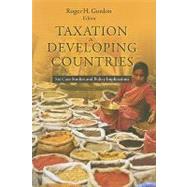Taxation in Developing Countries
, by Gordon, Roger- ISBN: 9780231148627 | 0231148623
- Cover: Hardcover
- Copyright: 6/23/2010
Taxes are a crucial policy issue, especially in developing countries. Just recently, proposals to raise middle-class taxes toppled the government of Bolivia, and plans to extend or increase the rates of the value added tax in Ecuador and Mexico caused immense political unrest. Despite the role of tax policy in guiding economic growth and affecting political stability, a comprehensive study of the issue and its impact on developing countries has yet to be written. Treating Argentina, Brazil, India, Kenya, Korea, and Russia as key case studies, the essays in this volume outline the major aspects of each country's current tax code and explore their larger economic and political implications.Examples of both the poorest and the wealthiest developing countries in the world, Argentina, Brazil, India, Kenya, Korea, and Russia provide examples of the diverse fiscal problems of tax reform. Each economy relies heavily on indirect and corporate income taxes, though in recent years some have shifted from excise to value added taxes and they have reduced tariff rates. An informal economy remains important in most of these countries. Tax evasion by firms in the formal sector is a significant concern. As a result, tax revenue is low even though rates are as high as those in developed economies. Various unconventional methods to collect revenue have been implemented, including bank debit taxes, state ownership of firms, and implicit taxes on individuals working in the informal sector. Exploring these methods, tracking changes in tax law and administration, and assessing fiscal pressures as these countries move forward, this collection helps to grasp the current and future issues of tax administration in the world's poorer economies.






